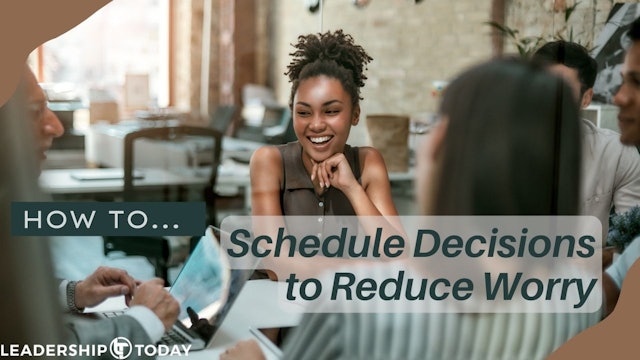-
How To - Overcome a Fear of Delegation
Most leaders struggle with delegation. Here are some principles to keep in mind to delegate effectively.
-
How To - Overcome Procrastination
Procrastination has been described as “our favourite form of self-sabotage” (Alyce Cornyn-Selby). In this video we explore how to overcome it.
-
How To - Take a Holiday
We all know holidays are important, but in our always-on work culture it can be hard to take a genuine break. There are some practical steps you can follow to ensure your holiday is a success for you and your colleagues.
-
How To - Make Meetings Great
Research demonstrates that many of our meeting habits have shifted over the past few years. This has resulted in negative ratings of collaboration and the opportunity to discuss dissenting views. Thankfully science shows us six rules to make meetings great.
-
How To - Benefit from Mind Wandering
Mind wandering is usually viewed negatively. We typically view mind wandering as a failure to maintain focus, taking us away from something to which we should be paying attention. However, mind wandering may not be quite as bad as we thought. It's often in those mind wandering states that we come...
-
How To - Schedule Decisions to Reduce Worry
Sometimes we can become overly focused on a change or decision, with our thinking looping back repeatedly. This can sap our energy and reduce our focus. Scheduling a time in advance to make a decision can improve this dramatically.
-
How To - Optimise the Three Stages in Any Meeting
When people complain about meetings, it's usually about how they are run rather than the meeting itself. Ineffective meetings often end up leading to even more meetings. Being able to plan and run an effective meeting is a core skill for any leader. Recognising the three key stages in any meeting...
-
How To - Learn at Double Speed
No doubt you’ve watched a video or listened to a podcast or audio book at double speed. Our ability to still absorb information when it is coming at us twice as fast is quite amazing. But surely there’s a drop off in how much we’re actually taking in. Well, according to a recent study published i...
-
How To - Make the Most Out of Practice
“Practice makes perfect”, at least that’s how the old saying goes. In fact, you’ve probably also heard that 10,000 hours of practice makes you an expert. While the general principle is right, that practice is an essential part of becoming an expert, the exact number of hours is at best arbitrary....
-
How To - Stop Procrastinating
Procrastination plagues many of us. In fact, research suggests that around 25% of people have procrastination as a defining personality trait. But whether you procrastinate all the time or just every so often, I’m sure you would love to procrastinate a little less. Learn some practical steps to try.
-
How To - Have Better (and Fewer) Meetings
Over the past 50 years, the average amount of time leaders spend in meetings has steadily increased from below 10 hours per week in the 1960s to now approaching 23 hours per week. Research reveals three factors we need to get right to make meetings effective. We also share five ways to have bette...
-
How To - Take a Break
Being busy and being effective rarely go together. In this video we explore the importance of recovery and breaks for our performance. You will find seven ideas for making a change to the way you work to deliver even greater results while also looking after yourself and others.
-
How To - Prioritise Treating People Well
Treating people well matters, and not just because it’s the right thing to do. Research shows that people who feel they are treated fairly perform better, and have higher team and organisational commitment. Find out five practical ways busy leaders put their people first.
-
How To - Say No While Remaining Helpful
Being able to say "no" is a key part of being an effective leader. But how do we do it and still remain helpful? In this video we share two tips that will help.
-
How To... Work Even Smarter
We’ve all heard the mantra, work smarter, not harder. But sometimes our idea of ‘smarter’ still isn’t the smartest way to work. Here's how to make sure we're doing the right work.
-
How To - Match Your Work to Your Sleep-Wake Cycle
We all have preferences for our working hours based on chronotypes. Here are some tips if you're struggling with your sleep/wake cycle at work. Take this questionnaire by the Center for Environmental Therapeutics to discover your chronotype - www.cet-surveys.com/index.php?sid=61524
-
How To - Take a Broader Perspective
Our thinking can fall into a rut over time. This week we explore five ways to take a broader perspective.



















